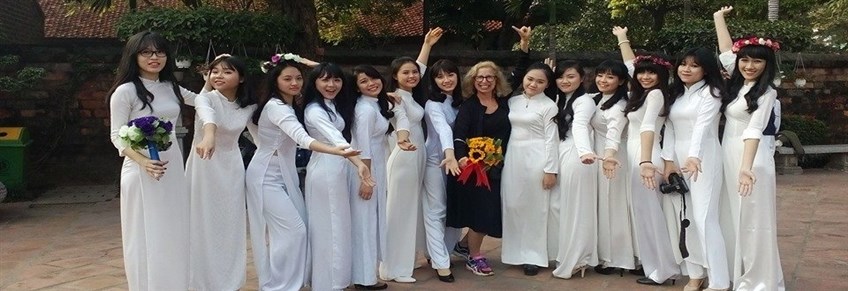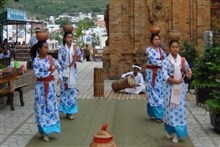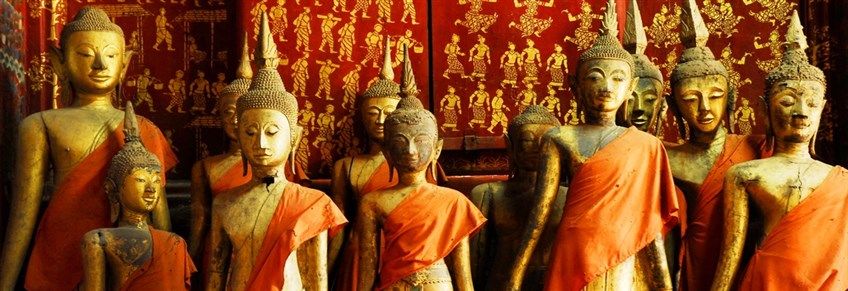
Recent indications suggest that this region was one of the earliest in which the people grew crops. With the coast to east and south and mountains to north and west the territory that is now Vietnam had natural boundaries. The first indications of a state were as long ago as 2790 BC and with the natural boundaries providing good defence for many years the region avoided foreign conquest. When the Chinese finally took over it took a long time before it could rid itself of a series of Chinese dynasties. The result was much of its national identity and language suffered. Vietnam travel packages will however include time visiting ethnic groups who have certainly been unaffected by outside influences for generations.
When Ngo Quyen managed to expel the Chinese in the 10th Century there was then a series of Vietnamese rulers but also a considerable amount of internal conflict. That continued throughout the 17th and 18th Centuries with the Nyugen lords ruling the south and the Trinh ruling the north; their war allowed European countries to trade in weaponry, the Portuguese helping the Nyugen, the Dutch the Trinh. Relative peace was restored with the Nyugen expanding to take territory from the Cham further north and the Khmer around the Mekong Delta. Both the Cham and Khmer left their mark and Vietnam holidays are able to include great historical content when they are put together by a good Vietnam travel company.

The French
Through the early 19th Century there was relative instability but ultimately it was the arrival of the French that resulted in the term ‘’Indochina’’ for the wider region. Western traders were being viewed with suspicion with attempts to introduce Catholicism generally resisted. That resistance was seen as an excuse for France to invade. In 1858 Napoleon III ordered an attack on Danang with minimal success but over the next decade French troops gradually took over some poorly defended areas further south. Attacks in the north followed and following the Tonkin Campaign they succeeded; French Indochina was announced in 1887 also including Cambodia, and a few years’ later Laos. These two and Vietnam are all available from a Vietnam travel agency.
This was fairly late in the colonial era as European expansion into other parts of the world had been a feature for two or three centuries. Internally there were movements looking for independence while the French put their stamp on the country in a number of ways; their architecture and wide boulevards are still a feature of cities such as Hanoi and Ho Chi Minh City which will always be included in Vietnam holiday packages.
Fight for Independence
Independence movements developed outside the country, in China and Japan while the rise of communism proved another spur to independence. The French countered each of these movements but the advent of World War II brought things to a head. Vietnam found itself effectively under Japanese control, albeit under the puppet Vichy regime in France. Nguyen Ai Quoc, known more popularly as Ho Chi Minh, formed the Viet Minh Front in 1941 but the defeat of the Japanese saw the French return initially. The Front however had begun a subtle infiltration across the country from its mountain bases and announced independence in September 1945. With no agreement agreed with the French hostilities began. They lasted eight further years before Dien Bien Phu, defeat for the French resulted in independence, but two countries, North and South with the USA supporting the South on an anti-communist platform.

Within a decade war resumed between the two with US troops and aircraft playing a prominent if ultimately fruitless role. Peace was signed in January 1973 but not before many Northern Vietnamese had already infiltrated the south. The Cu Chi Tunnels north of Ho Chi Minh City are evidence that Vietnam private tours will offer to show tourists how the Viet Cong lived, sheltered from American bombing and often living underground for days and days on end.
Many more then followed the initial infiltration and ultimately Saigon fell in April 1975. The Socialist Republic of Vietnam was formed and became a member of the United Nations in 1977.Saigon was renamed and what is now Ho Chi Minh City is now the biggest city in Vietnam and a very important economic hub.
That was not the end of problems for Vietnam. The west still opposed communism while Vietnam was drawn into a war with Pol Pot and the Khmer Rouge. Their victory has benefitted not only Cambodia but the rest of the region; that regime was a blot on the history of mankind. Gradually more and more countries quite rightly recognised Vietnam.
The fall of the USSR created some economic issues but in general Vietnam has developed impressively over the years. Its economy has been growing and Vietnam tours have certainly helped in this sector.














